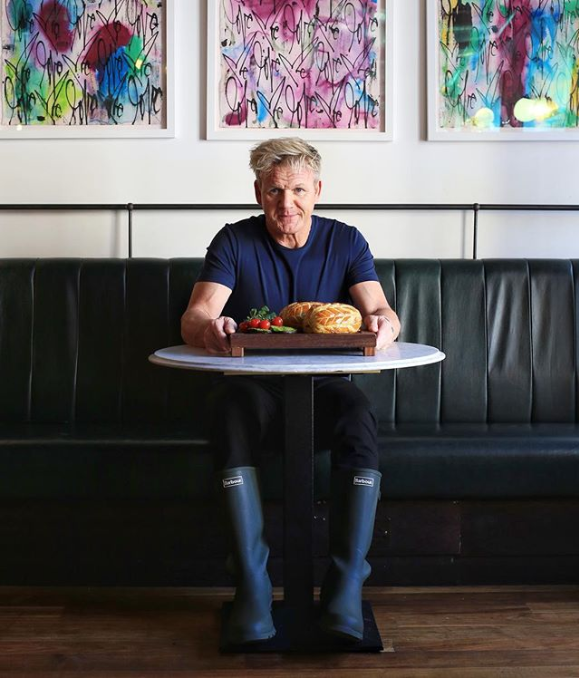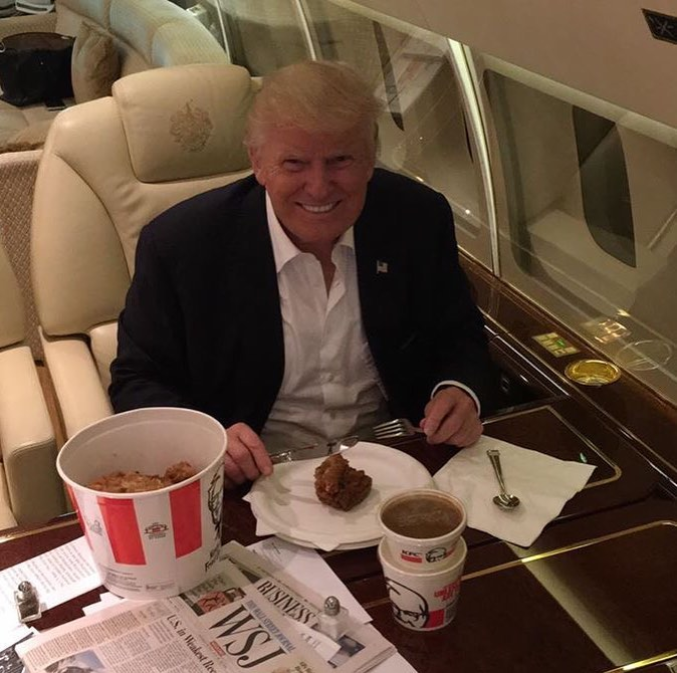Credit: Instagram/@realdonaldtrump
When it comes to food, politicians risk much more than indigestion each time they eat. Food is an oft-underestimated political power player that decides elections, overhauls political systems and makes or breaks careers.
Written by Sabrina Maddeaux
Ed Miliband may never eat a bacon sandwich again. In 2014, the seemingly benign food item helped demote Miliband from Leader of the Labour Party to ordinary citizen when he was photographed awkwardly eating one at a local cafe. Ketchup oozed, grease dripped and Miliband’s face contorted into that of Mr. Bean after a healthy swig of some very sour milk.
The British press had a field day. “Ed Miliband fails to look normal while eating bacon sandwich,” headlined an article in the Independent. The Sun ran a cover emblazoned with “Save Our Bacon,” saying, “don’t swallow his porkies and keep him out.” The leader’s inability to consume an everyday bacon sandwich in a dignified manner was equated with his inability to run the nation. Ultimately, he lost the election.
Miliband’s food-adjacent fate was anything but unique. Many a politician has suffered at the hands of seemingly simple fare. Take, for example, the uproar that ensued when former Mayor of New York City Bill de Blasio dared eat a slice of pizza (a sacred food in the Big Apple) with a dainty knife and fork. New York Magazine called the incident a “disaster” and it so coloured his time in office that the infamous fork sold for $2,500 at auction in 2014.
There’s been much disdain for President Donald Trump’s love of well-done steak doused with ketchup, habit of ordering KFC to private jets, and insatiable McDonalds cravings. While these choices reinforce half the population’s opinion of him as an uncultured, unintelligent rube, his supporters, on the other hand, find kinship.
“It’s a way to show his base that, while he’s supposedly a billionaire, he’s still one of them,” says Fabio Parasecoli, a professor in the department of nutrition and food studies at New York University (NYU) whose research explores the intersections among food, media, and politics. “Food is absolutely political in terms of what we eat, how we eat, with whom we eat, who gets what and who decides [what we eat]. Those are fundamentally political questions.”
Most often, politicians’ success or failure with food hinges on whether they can use it to seem like any other ordinary citizen. “Politicians want to be seen eating the food of the people; they don’t want to be perceived as out of touch or elitist, which, at the moment, is a very bad word,” says Parasecoli. This explains why de Blasio eating pizza with utensils or Obama commenting on the price of arugula is met with condemnation, while some of Trump’s poorer dietary choices are heralded– especially by those in Middle America who fear being left behind with changing times.
The history of food in politics


The connection between food and politics isn’t anything new. In fact, it goes back centuries and often intermingles – as it does with Trump – with socio-economic class relations. Julius Caesar was often noted to avoid luxury foods, so as to seem more at one with the people. Historically, military leaders expressed commonality with their troops by dining with them. Gluttony was often been looked down upon, particularly in societies with struggling economies or large wealth gaps, as it could be interpreted as flaunting one’s richness.
“Food was central to the reforms that happened in China in the 80’s. Farmers were basically left free to grow whatever they wanted after they had grown and delivered what they were supposed to do for the government,” says Parasecoli. “So they started growing and selling, and it was the beginning of the free market and had a huge impact.”
Food is similar to fashion in its undervalued political power. It seems superficial and harmless at first glance, but actually wields great power. Fashion is a powerful communicator in part because we all wear clothes, and the same goes for food. “Food is relatable to people, so it’s one thing that we can use to try and understand one another– especially as politicians can be enigmas we don’t have much of a connection with,” says Abbey Sharp, Toronto-based culinary Registered Dietitian (RD) and food blogger. “Food helps to make sense of these larger-than-life characters… it humanizes them.”
Food as a social tool


As celebrity chef culture and platforms like Instagram intensify our obsession with food, it will likely only wield more influence in politics and beyond. “Now, more than ever, we judge people based on their food choices. People have preconceived notions of what a vegan looks like or what someone following a keto or paleo diet looks like. More and more, we subscribe to these so-called ‘lifestyles’ to communicate our identity and classify others,” says Sharp.
Politically, lack of food has been as influential as food itself. “Many revolutions have been driven by lack of food; lack of food is one of the reasons people riot,” says Parasecoli. “Great political instability happened in 2008 and 2009 when there was a huge spike in the price of commodities. You had demonstrations and riots from Indonesia to Egypt.”
Ironically, for all our obsession with food when it comes to campaigns and opinion polls, food ranks low on our collective priority list when it comes to actual policy. According to the American Medical Association, food is the number one cause of poor health in America. While first ladies like Michelle Obama may tackle some food issues, the greater problems of food disparity, training medical professionals in healthy eating, funding nutritional research, holding large food suppliers to account, food contamination and farming practices (just to name a few) are largely ignored by political leaders.
The one policy area where food may exert great influence over the coming years is the U.S.’s trade agreements and, in particular, NAFTA negotiations. If Trump’s trade wars affect food supply, prices and profits, he may soon experience a rude awakening in just how powerful food can be. “If other countries decide to retaliate, they will will probably retaliate in agricultural products, which will hit precisely the states that voted for Trump,” says Parasecoli. “That can become a political liability in the long run– not for 2018, but it could be a big problem for 2020.








